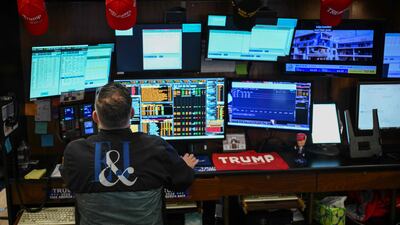Stock markets ended the week mixed, reversing rallies on Friday after US President Donald Trump accused China of “totally violating” their trade deal, reigniting tensions that had simmered down after a detente three weeks ago.
Mr Trump, in a post on his Truth Social platform, said US levies made it “impossible” for China to trade with the US, and that the “fast deal” was struck to prevent a “very bad situation” for Beijing.
US Trade Representative Jamieson Greer said China was “slow-rolling” its compliance with the agreement, particularly on minerals and rare earth magnets.
The US and China, the world's two biggest economies, have been the main protagonists in the trade war, with Washington imposing 145 per cent tariffs on Chinese imports. Beijing responded in kind, posting 125 per cent levies on American imports.
However, on May 12, the White House announced that both sides struck a surprise deal to suspend their tariffs for 90 days, with the US and China lowering their levies to 30 per cent and 10 per cent, respectively.
Mr Trump's latest tirade jeopardises their progress. China hit back at the US, with its embassy in Washington saying it had been in constant contact, particularly concerned about trade controls in semiconductors and “other related practices”.
“China once again urges the US to immediately correct its erroneous actions, cease discriminatory restrictions against China and jointly uphold the consensus reached at the high-level talks in Geneva,” embassy representative Liu Pengyu said in a statement.
After stock markets closed on Friday, Mr Trump poured more fuel on the trade tensions fire by threatening to double steel and aluminium imports to 50 per cent, which he claims is another part of his strategy to protect American industry.
Shortly after making that announcement at a US Steel factory in Pennsylvania, Mr Trump wrote on Truth Social that the higher levy will come into force on June 4.
That capped a whirlwind week for his grand tariff plans. On Thursday, the New York-based Court of International Trade blocked his tariffs, saying he exceeded his authority. But on Friday, a federal appeals court temporarily upheld his actions.
Josh Gilbert, market analyst at eToro, said that while the appeals court has allowed tariffs to stay for now, the legal battle is far from over.
“The White House is taking its case to the Supreme Court and weighing other legal options, which, to be frank, are unlikely to be quick or straightforward. This uncertainty adds yet another layer of risk for investors.
“What we’re seeing is just another example of today’s current market conditions and how news flow, especially from a political standpoint, is injecting volatility into markets.
“Whether you’ve been investing for 10 weeks or 10 years, this is a tricky market to navigate. This constant policy whiplash is beginning to leave investors sore … diversification and a clear strategy remain the best tools for navigating this policy-driven turbulence.”
At the close on Wall Street on Friday, the Dow Jones Industrial Average ended 0.1 per higher, while the tech-heavy Nasdaq Composite shed 0.3 per cent. The S&P 500 was almost flat.
For the week, the S&P 500 added 1.9 per cent, the Dow gained 1.6 per cent and the Nasdaq climbed 2 per cent. Year-to-date, the S&P 500 is up 0.5 per cent, while the Dow and Nasdaq are down 0.6 per cent and 1 per cent, respectively.
In London, the FTSE 100 ended more than 0.6 per cent higher, as trade remained stable despite uncertainty triggered by the latest in the tariffs saga.
Paris' CAC 40 retreated 0.4 per cent, while, Frankfurt's DAX added 0.3 per cent.
Earlier in Asia, stock markets reversed gains to end lower. Tokyo's Nikkei 225 and Hong Kong's Hang Seng index were both down 1.2 per cent, while the Shanghai Composite retreated 0.5 per cent.
In commodities, oil prices slipped and posted a second consecutive weekly decline as the Opec+ alliance prepares for its meeting on Saturday, where it is expected to announce its third major output increase.
Brent fell 0.39 per cent to settle at $63.90 a barrel, while West Texas Intermediate dropped 0.25 per cent to close at $60.79 a barrel.
Gold, meanwhile, inched down at the close on Friday, as the market absorbed the tariff drama and the dollar moved higher.
The precious metal, a hedge against inflation, was down nearly 1 per cent to $3,289.57 an ounce.




